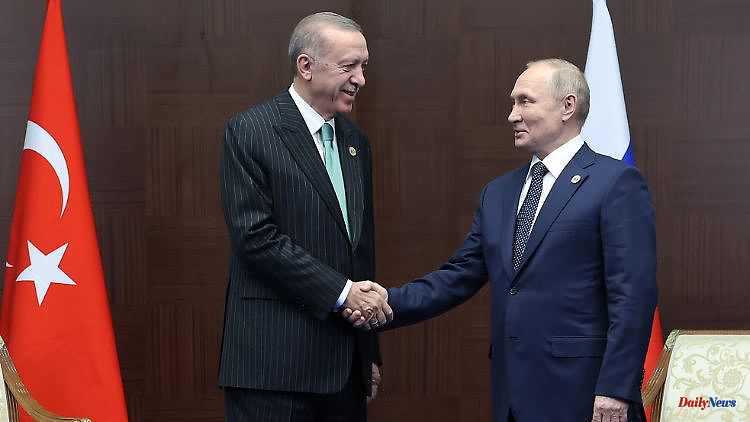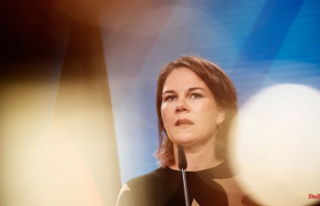Almost all Western countries have long since broken off the official channels of communication with Russia. Hardly any of the heads of state or government want to sit down with Vladimir Putin. Recep Tayyip Erdogan sees it differently: The Turkish President has a good relationship with the Kremlin boss and is really boasting about it.
In July, Turkey brokered a grain deal between Russia, Ukraine and the United Nations. This is to ensure that grain ships have a safe corridor across the Black Sea to send essential food items out of Ukraine to the world. At the end of October, Russia suddenly withdrew from the deal prematurely, only to rejoin a few days later. Has Turkish President Recep Tayyip Erdogan used his good relationship with his Russian counterpart Vladimir Putin?
But first things first: When Russia pulled out of the grain agreement in October, Moscow justified it with the drone attacks on Russian warships in the Crimean port of Sevastopol. Russia accuses Ukraine of carrying out the attacks under the guidance of British specialists.
"The grain agreement is an indirect means of pressure because grain exports are one of the few sources of crisis for Ukraine," said military expert Gustav Gressel on ntv. "The war costs Ukraine between 30 and 40 million euros a day. If this money can no longer be generated in the country, it has to be borrowed from outside. Putin's calculation is that at some point it will be too much for the West."
In this respect, what happens a few days later seems strange: Putin backs down from backing down and rejoins the grain agreement. Supposedly because Ukraine is said to have made new guarantees beyond the original agreement. Namely, that the corridor and the ports will really only be used for the export of food, according to Moscow. Kyiv denies that new guarantees have been given.
It is known that there was a phone call between Putin and Erdogan before the agreement was reached. The Turkish leader said afterwards that Russia only returned to the agreement because of its good personal relationship with Putin. That is the only reason why more than nine million tons of grain could be sent from the Ukrainian ports to the world.
Rainer Munz, ntv Russia correspondent, sees it differently. Putin's maneuver is not a direct reaction to Erdogan, rather the Kremlin chief has realized that the wheat deal is not really a means of exerting pressure. "What are you supposed to do if Ukraine, in cooperation with Turkey and the UN, still allows the wheat ships to sail? Do you want to sink them? That was simply not possible. And that was also noticed in the Kremlin, it was a face-saving Action."
Erdogan, meanwhile, remains adamant about his version of the story. While Putin doesn't even talk to other heads of state or government, after his call he "immediately opened the grain corridor," Erdogan said on Turkish television last week.
In return, Putin has praised Turkey: thanks to Turkey's mediation, Ukraine has promised not to fight Russia in the Black Sea shipping corridor - but to use it only for grain transport. Putin explicitly praised Erdogan's neutrality and how he works for poorer countries.
These words are no coincidence, after all, Turkey has recently become more and more important for Russia. The reason is the Western sanctions against Moscow, in which Turkey is the only NATO country not to participate.
In August, Erdogan even visited his autocrat buddy at his summer residence in Sochi. The two agreed to expand their economic relationship even further. Turkey also wants to join the Shanghai Cooperation Organization (SCO). This is an economic union with members like Russia, Iran, China or India. "But you shouldn't set that too high. This alliance has very different interests and many internal conflicts. But 30 percent of the world economy is united there. That's interesting for Turkey. And Erdogan also needs foreign policy successes, he wants to be re-elected be," said ntv correspondent Munz.
For both states, their relationship is a kind of alliance of convenience. For Russia, the economic advantages are obvious. Turkey is an important gas buyer for Russia, while the other major customers in the West have withdrawn. Exports from Turkey also allow Russia to partially circumvent western sanctions. Turkey imports goods from other EU countries because it is in a customs union with the European Union.
In fact, the booming trade relations could at least have been a reason not to be underestimated for Putin to give in to the grain agreement. According to the Ministry of Commerce in Ankara, Turkish exports increased by 86 percent in October compared to the previous year, and imports from Russia more than doubled.
Turkey, for its part, depends on Russia. Last year, most vacationers in Turkey came from Russia, 19 percent. This year it will be significantly less, but Turkey hopes to contain the minus to some extent. "According to Turkish sources, Turkey is missing almost five million visitors from Russia this year. But also about two million from the Ukraine. Podcast "Learned something again" reports. This is one of the reasons why there are few restrictions for holidaymakers from Russia in Turkey.
Not only holidaymakers come from Russia, but also large investments. The Russian nuclear company Rosatom is currently building a nuclear power plant worth billions in southern Turkey.
In general, Ankara has become an "important economic lifeline" for Moscow, analyzes the Financial Times. At the same time, Erdogan played himself up as a "peacemaker". "One hand washes the other. Both need each other," summarizes Hüseyin Bagci, head of the Institute for Foreign Policy in Ankara, in an interview with the US newspaper.
Putin's close ties to Erdogan can also help him in the course of the war in Ukraine. Because the Kremlin ruler maintains good and constant contact with Erdogan, he has a "diplomatic rescue line" into NATO, as the Financial Times aptly describes. This could still be important for Putin, in order to persuade Ukraine to negotiate a solution with the help of the West. Because with his war of aggression he can currently, as it seems, achieve nothing but destruction.












